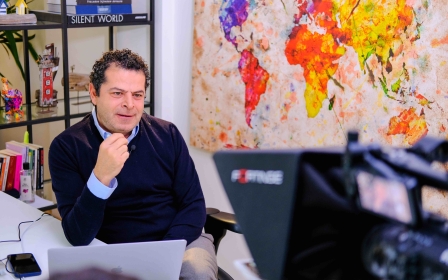Mixed reactions as Egypt plans to tax social media content creators

Egypt has announced plans to tax its social media content creators, triggering mixed reactions.
In a statement issued on 25 September, the Egyptian tax authority said that "YouTubers and bloggers" earning over 500,000 Egyptian pounds ($32,000) a year would be taxed.
One of the country’s senior tax authority officials, Mohamed al-Gayyer, spoke on a telephone interview with the Sada al Balad satellite channel to ease any confusion regarding the new tax.
“Anyone who makes a profit in Egypt must be fairly taxed whatever their field of work is,” he said.
Al-Gayyer also confirmed that the calculation of the new tax would start from 1 January until 31 December 2021.
New MEE newsletter: Jerusalem Dispatch
Sign up to get the latest insights and analysis on Israel-Palestine, alongside Turkey Unpacked and other MEE newsletters
Another tax official, Mohamed Keskh, confirmed that those who fail to comply with the new decision could be found in breach of tax evasion laws, an offence carrying a jail sentence of up to five years.
Mixed reactions
Online, the decision sparked controversy with very split reactions to the new law.
Some took to Twitter in support of the new decision, believing it fair for those earning an income via their online platforms to be taxed.
Translation: I swear if I earned half a million pounds from YouTube or TikTok, or any other site I wouldn’t have any problem at all paying taxes… seriously, what is all this shouting for?
Translation: On the subject of taxes on YouTube, it is correct to impose taxes on Google, YouTube, Facebook, Twitter, etc. why? Because they benefit from users in Egypt through advertisements and data available to them without paying any real taxes.
Others disagreed, taking the stance that the Egyptian government has no authority to tax internet personalities.
Translation: The issue of imposing taxes on YouTube channels and profiting from the internet is very annoying. How do I register an entity and pay taxes for it when the state itself is not the one who offers me the service! If I woke up one day with the channel closed, how would you help me? There are people who make millions, take from them, but this channel has no home, no shop, and is not on land belonging to the state.
The US already taxes the video-sharing platform YouTube, which in turn taxes its YouTubers. For some, this means that there is no justification for Egypt to impose any further taxation.
Translation: This issue of YouTubers’ taxes will create a legal problem because YouTube already takes taxes from YouTubers; profits that are paid in America. So how will they pay other taxes for it in Egypt?
One user appeared to agree with the new taxation, providing that the money taken in taxes is used to benefit the wider public.
“If the government will impose taxes on YouTubers and internet personalities, then it is the least of their duty to improve the quality of the internet,” they wrote.
Social media in Egypt is highly policed. The law allows any social media account with more than 5,000 followers to be monitored. Meanwhile, authorities have used the country’s cybercrime laws to imprison and fine those whose online content is deemed inappropriate.
Middle East Eye delivers independent and unrivalled coverage and analysis of the Middle East, North Africa and beyond. To learn more about republishing this content and the associated fees, please fill out this form. More about MEE can be found here.




